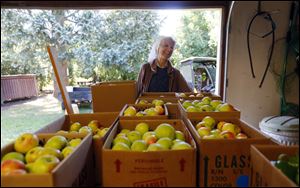
Sylvania garden grows food for the needy
8/15/2014
Sister Grace Ellen Urban stands near a table of apples grown in the Sisters of St. Francis' Garden for the Poor.
Somewhere in a Sylvania garden carrots grow in winter, tomatoes plants stand four feet high, and giant cabbage heads spring up from the earth at the start of Ohio’s growing season.
What causes the perpetual sprouting of healthy crops? It’s not some super grow fertilizer.
It’s the Sisters of St. Francis.
PHOTO GALLERY: Click here to view slideshow.
Sister Jeremias Stinson, superintendent of environmental stewardship, and Sister Grace Ellen Urban, assistant superintendent of environmental stewardship, cultivate an outdoor garden and polyhouse, a plastic covered greenhouse, year-long on the Motherhouse Grounds, 6832 Convent Blvd. Both gardens are next the Alverno Studio and near the Rosary Care Center.
The harvested crops benefit the Helping Hands of St. Louis in Toledo. Helping Hands uses the produce for its pantry, where it is given to families for their weekly groceries and where the produce goes into meals cooked in its soup kitchen.
“We take for granted that we can walk into a store and purchase food. A lot of people cannot do that,” said Paul Cook, Helping Hands director of facilities. The outreach center located at 443 6th Ave. is open to all. It provides clothing, informational support on applying for social services, and help with daily life activities including hygiene.
In the beginning, 1992, there was just the Back Garden, a 4,500-square-foot plot of land dedicated to growing foods for those in need. As the effort grew the two sisters recognized that “hunger is not seasonal.” In 2006 a polyhouse was constructed, featuring solar energy to heat the inside and water that runs through underground pipes. In turn the water heats the soil and voilà, sown seeds grow in the fall and winter.
Last winter it was 46 degrees below zero with wind chill outside. But in the polyhouse it was 72 degrees and the soil was 70 degrees. The warm temperatures allow the sisters to get a jump start on the growing season.
Inside the lush Back Garden the sisters walk through rows of green peppers, hot yellow peppers, small strawberry plants, lush zucchini plants with spreading vines, and a row of potato plants. The first giant potato was dug up from the ground on Thursday.
In one corner a peach tree stood, leaves fluttering in the wispy wind. Nearby, an apple tree bearing fruit, and a tangle of twisted grape vines.
This year alone the two women have plucked from the fertile garden 124 pounds of tomatoes, 201 peppers, 26 cabbages, 50 cucumbers, 86 squash, 16 beets, and 101 hot peppers.
“We aren’t food suppliers. We can’t feed the masses. But, for us to show up on a weekly basis to the soup kitchen with baskets of food, it gives them courage and lets them know we are thinking of them everyday,” Sister Jeremias said.
Inside their humble workshop, that was once a garage, is a wall lined with pitchforks, rakes, and shovels in large and small sizes. The two women have been working together tending the Motherhouse Grounds in terms of horticulture and forestry needs since 1990.
Their garden effort is not only a benefit to a local organization, it is also a model for other gardeners and farmers, proving that crops can flourish in the off-season, during Ohio’s frigid winters. Franciscans in Milwaukee and New York have stopped by the grounds to learn about the 12-month growing season.
Sister Jeremias said it also shares information with and is recognized by the United States Department of Agriculture regarding their findings. The two record data on what methods were used and the outcomes.
“This is a live experiment. We are changing the concept. You can do this in your backyard and it can become a sustainable food source,” Sister Jeremias said. The two welcome visitors to learn about their growing methods and techniques. For more information call Sister Jeremias at 419-824-3623.
Contact Natalie Trusso Cafarello at: 419-206-0356, or ntrusso@theblade.com, or on Twitter @natalietrusso.